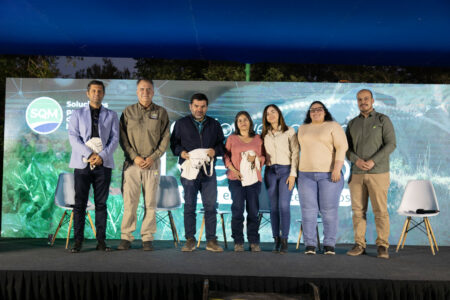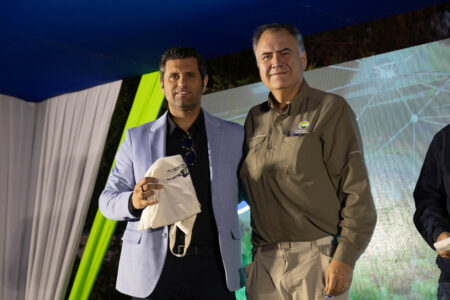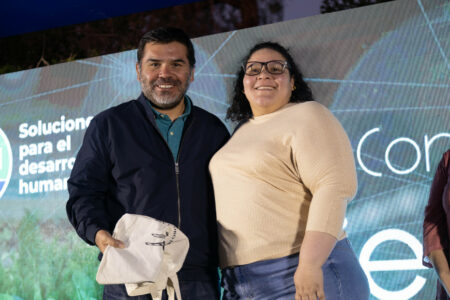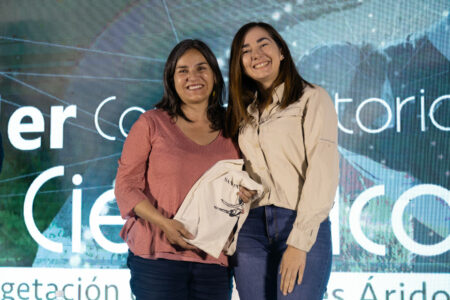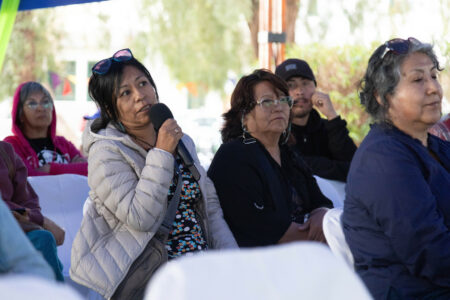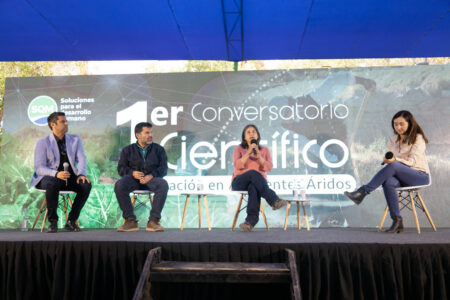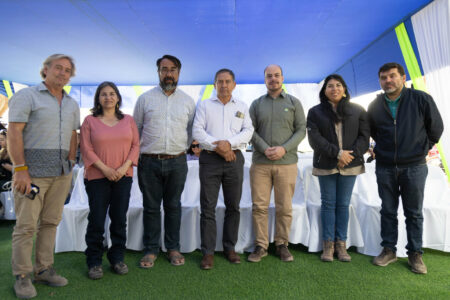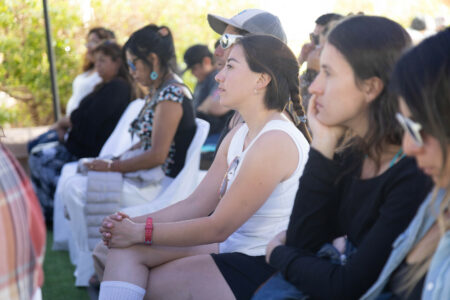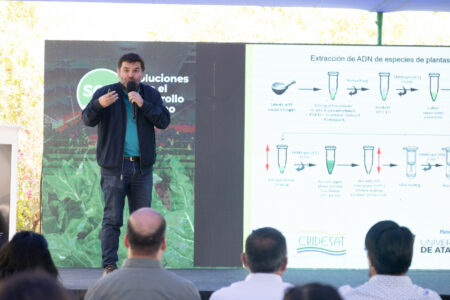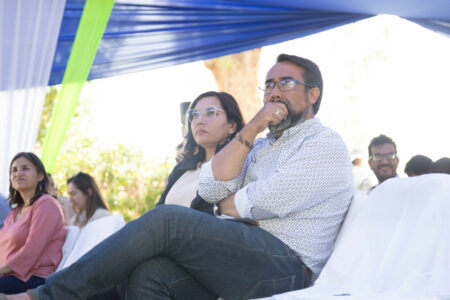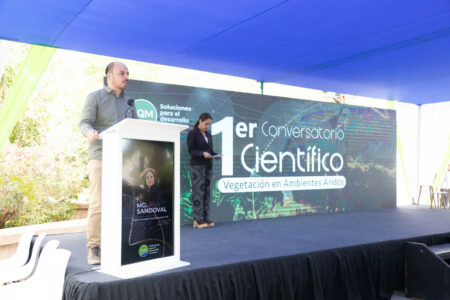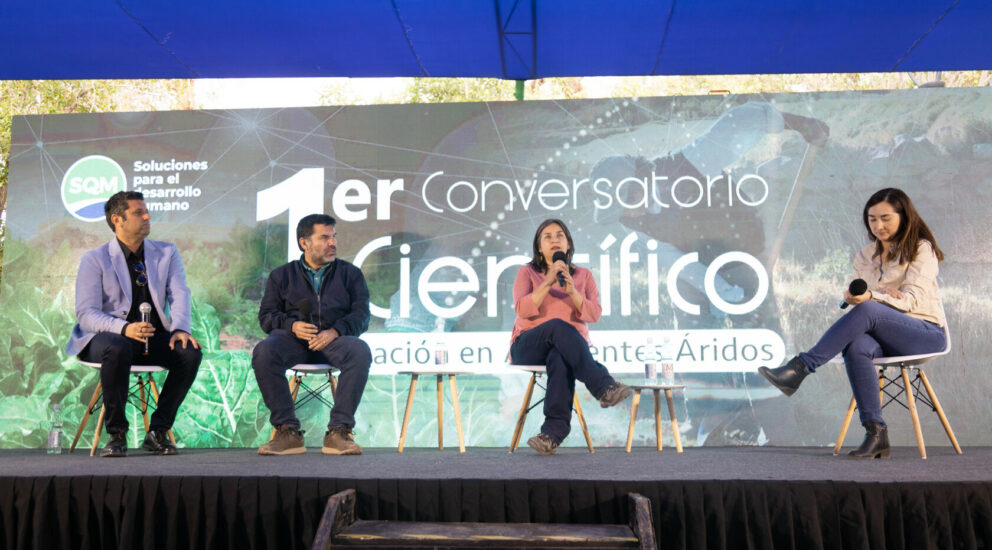
Great turnout for SQM’s First Scientific Discussion held in San Pedro de Atacama
05/Dec/2023
Three highly-experienced experts participated in the event and gave presentations on the topic of vegetation in arid environments. This initiative could be seen live throughout Chile via the company's platforms and social media.
SQM’s first Scientific Discussion, Vegetation in Arid Environments, in the San Pedro de Atacama town square boasted a great turnout with presentations by leading experts: Ana Sandoval, who has a master’s in plant conservation and works at the Agricultural and Livestock Research Institute (INIA); Roberto Contreras, who has a PhD in genetics and cell biology from Universidad Complutense de Madrid and currently works at the Atacama Regional Center for Sustainable Research and Development (CRIDESAT); and Felipe Carevic, who is a scholar and researcher at the School of Renewable Natural Resources at Universidad Arturo Prat and has a PhD in environmental management from Universidad de Huelva.
Such scientific discussions seek to forge a solid link between scientific research and the community, and to encourage participation from neighbors in addressing pertinent environmental issues of high local and regional interest.
“The fact that meetings with scientists can be arranged is very important for our territory. It does not happen very often, and it lets those of us who are interested in science and who work in science to get up to speed and learn about the work being done by various scientists,” commented Leticia González, who traveled from Toconao for the discussion.
Nelson Sarmiento, a resident of San Pedro de Atacama, remarked, “I think it is a very beautiful opportunity to see how science plays a role in the territory, how they understand the different aspects of everything produced here in the desert, as a nucleus of knowledge in diverse areas. The most prominent field is astronomy, but it is not the only one. There is also archeology, as well as biology and climate science, all of which is very interesting to learn about and understand.”
This opportunity for engagement was highlighted by the presenters, who seek to bring this type of topic closer to the community, making it understandable and helpful for those who see science as an opportunity for local development.
“I really appreciate the chance to showcase what we do. These events that open up science and knowledge to the community are very important, because often scientific work is published in documents, in journals, but does not come to light, so one way to do that is by talking,” explained Ana Sandoval.
Dr. Roberto Contreras pointed out that “these are chances for a researcher to dialogue with people, to have a simple conversation about the technical part that we see in science. We are very happy and I am grateful for these opportunities because a fluid conversation develops with people since one can sense their interest.”
Dr. Felipe Carevic mentioned that “this is one of the few opportunities we have to get closer to the communities, to the people who are directly related to biodiversity on a daily basis because the discussion dealt with the native flora and vegetation, and I was very impressed by the great interest of the people attending (…) to ask us about certain species or natural biological mechanisms that occur in the Atacama Desert, the oldest and most arid desert in the world.”
This event exceeded expectations and reached not only the attendees in San Pedro de Atacama. It was also broadcast live on SQM’s social media accounts, attracting a large audience from around the country.
Julio García, SQM’s Environmental Manager, highlighted this first scientific discussion, which left everyone very satisfied with the excellent presentations that “effectively brought the knowledge about vegetation in arid environments closer to the attendees, with very clear examples and also a very good response from the public both here in San Pedro de Atacama and through SQM’s social media, where interesting questions were asked regarding the conservation of plant species and their relationship with agriculture and tourism, with different threats faced by this ecosystem, which is so important and so fragile at the same time.”
This was a successful first conversation, and others will be scheduled on a variety of topics of interest to the community.
